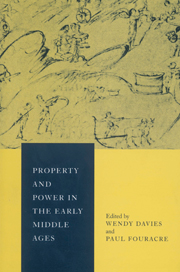Book contents
- Frontmatter
- Contents
- List of maps
- Preface
- List of abbreviations
- Introduction
- 1 The ideology of sharing: apostolic community and ecclesiastical property in the early middle ages
- 2 Teutsind, Witlaic and the history of Merovingian precaria
- 3 Eternal light and earthly needs: practical aspects of the development of Frankish immunities
- 4 The wary widow
- 5 Lordship and justice in the early English kingdom: Oswaldslow revisited
- 6 Adding insult to injury: power, property and immunities in early medieval Wales
- 7 Property transactions and social relations between rulers, bishops and nobles in early eleventh-century Saxony: the evidence of the Vita Meinwerci
- 8 Monastic exemptions in tenth- and eleventh-century Byzantium
- 9 Property ownership and signorial power in twelfth-century Tuscany
- 10 Conclusion: property and power in early medieval Europe
- Glossary
- List of works cited
- Index
9 - Property ownership and signorial power in twelfth-century Tuscany
Published online by Cambridge University Press: 25 January 2010
- Frontmatter
- Contents
- List of maps
- Preface
- List of abbreviations
- Introduction
- 1 The ideology of sharing: apostolic community and ecclesiastical property in the early middle ages
- 2 Teutsind, Witlaic and the history of Merovingian precaria
- 3 Eternal light and earthly needs: practical aspects of the development of Frankish immunities
- 4 The wary widow
- 5 Lordship and justice in the early English kingdom: Oswaldslow revisited
- 6 Adding insult to injury: power, property and immunities in early medieval Wales
- 7 Property transactions and social relations between rulers, bishops and nobles in early eleventh-century Saxony: the evidence of the Vita Meinwerci
- 8 Monastic exemptions in tenth- and eleventh-century Byzantium
- 9 Property ownership and signorial power in twelfth-century Tuscany
- 10 Conclusion: property and power in early medieval Europe
- Glossary
- List of works cited
- Index
Summary
One of the crucial moments of social and political change in Western Europe has come to be seen as the years around the year 1000. Before it, we have the large, if crumbling, edifice of the Carolingian state, with its public structures, however rudimentary, and its interregional hierarchies of power. These hierarchies ultimately depended, it is true, on the landed wealth of kings, but they were firmly enough rooted in custom to allow considerable authority to be wielded by people who had royal favour, whether they themselves had local land or not. After it, the equation land=power was much more direct; power became limited by the number of armed men one could feed from one's land, and by one's capacity to control them once one had them there – considerable, if one was me duke of Normandy or (after a hiccup) the count of Barcelona; much less, if one was the count of Mâcon or the abbot of any one of a hundred miserable and newly impoverished monastic houses, menaced by the depredations of their armed neighbours and dependants. In recent years this shift has been theorized as the ‘feudal revolution’, and the early eleventh century, in particular, has been seen as a classic time of violence, as the new order set in, indeed took power by force; only in the late eleventh century, or perhaps in the twelfth, did this more small-scale and (above all) more military society begin to acquire its own rules: its own etiquette and ritual, but also an aristocratic moral code that came more and more to have the force of law, sufficient to marginalize the most uncontrollably violent members of the military elite and, in the end, to allow larger-scale political units to re-establish themselves on the basis of new rules.
- Type
- Chapter
- Information
- Property and Power in the Early Middle Ages , pp. 221 - 244Publisher: Cambridge University PressPrint publication year: 1995
- 1
- Cited by



